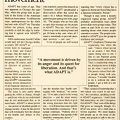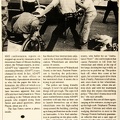[Headline] Breaking ' em out
[Subheading] Why Atlantis's Mike Auberger hates nursing homes
[image]
[no image caption]
If ADAPT members compare nursing homes to jails, it's because any of them have been in too many of both.
Mike Auberger, Co-director of Atlantis, Inc., in Denver, has been in over 20 jails nationwide, arrested in ADAPT actions over the past de-cade. In his job with Atlantis, he goes into Denver area nursing homes to spring people who doctors insist can't live on their own.
One of the places he frequents is Denver's Heritage Rehabilitation Center, licensed as a long term care facility, where Auberger says "Craig [Rehabilitation Center] sends its losers."
He tells the story of one 18-year-old put in the Center whose mother, says Auberger, lives 45 miles away and doesn't own a car. The Center "won't let her take her son out of there because they haven't trained her on tube feeding and respirator stuff.
"She takes the Greyhound down, seven days a week, to see her son. But Greyhound doesn't get her there when she needs to be there. They set up meetings for her at 8:30 in the morning. She can't get there on the Greyhound till 11." The rehab center, he says, "sets it up to fail; they set it up to keep him in there. They say they're not going to train her if she's not there at 8:30."
"This guy's probably got about a year to live," says Auberger. "When was at home his mom was pureeing food that she cooked; but here they've decided it's easier for them to tube feed." They can bill for more reimbursement that way, he explains. "All he wants is to go home. He knows he's gonna die. He wants his Mom's chile rellenos."
"It's incredible," Auberger says. "The place constantly set it up so that his mom was going to miss the meetings and not be able to take him home." To Auberger, the Center's intentions are crystal clear: "They can keep 'em there and bill Medic-aid; that's the whole point."
This client got lucky. He got out. "We went in there — we took our lawyer and our doctor; we didn't say anything to the nursing home." Atlantis's doctor, brought in by Auberger, "says there's no reason this guy can't go home." The man, Auberger and the doctor and lawyer he has brought meet in the home's cafeteria. "And all we do is we ask, `do you want our lawyer to represent you?' He says, 'yeah.' We ask him`do you want this doctor here to be your doctor?' "
He wants that, too, says Auberger. "Up comes the administrator," says Auberger, relishing the denouement of the story. "We introduce the doctor and the lawyer, and we say, 'he's leaving in a week. You train his mother when she gets in, and if you've got a problem about when she gets in, talk to our lawyer about it."
"In a week," says Auberger, "we got him out. He's had pneumonia a
12 THE DISABILITY RAG JULY/AUGUST, 1992
couple of times and been back in the hospital — but he hasn't been in a nursing home.
"That's what it's all about," says Auberger, with satisfaction. "Keep-in' em out."
At a typical "home," the administration is on the first floor, the patients on the second and third. "If you're a patient there, you can't go up or down; you're on the floor you're on, period." If you want to go down, "you have to get a nurse to take you," says Auberger. "There's no way of getting out of there period — without a nurse. All the doors have alarms on them.
"It's like a jail. There's no difference," he says. "And this is modern day treatment." Auberger points out, with irony, that the doc-tor for the Heritage Re-habilitation Center is also the doctor for a nearby prison.
People in facilities like Heritage are what's known in the rehab business as "losers," says Auberger — those who don't advocate for themselves. A typical "loser," says Auberger, may be 40 years old when he becomes disabled. "You hold all the preconceived prejudices about disability; you're a c-4 quad and you're depressed and you just don't really want to do anything but exist. You're not the wheelchair athlete, you're not the I'm-gonna-get-over-my-disability type."
Auberger charges that places like Craig hold to the approach of "you get over your disability," which he calls "that whole thing of `whitey.' If you don't play `whitey,' you're a loser — it doesn't matter whether your a para or a quad."
He suspects doctors send clients from one Denver-area rehab facility to another, shifting them as the allotted maximum time for each facility to be reimbursed for care is used up. A number of doctors have financial stakes in these facilities, he says.
"If you look at nursing home structures, what you find is a group of individuals, as a corporation, building a building, licensing it as a nursing home, then selling it to an-other corporation, which they also own, at an inflated price. Then that group will hire the same group" another corporation on paper, but still the same group of people, he insists "as the management corn-pany to run the nursing home.
[boxed text] If you don't play `whitey,' you're a loser.
"You collect depreciation for awhile on the new building" — as long as you can, he stresses "then you sell it at an inflated price to the second corporation. The second corporation is able to depreciate it again." Then, he says, the management company charges exorbitant rates to the owners to run the home so much that the original corporation goes bankrupt. But that, he insists, is the whole idea: "then they're out from any responsibility."
And the management company, which is all the same people any-way, is still running the facility and making money from insurance and Medicaid. "It's all legal," says Auberger, who says the majority of the money that fuels such scams is corn-ing from Medicaid.
Nobody ever writes about this, he says, because "it's all legal."
Auberger tells of one person who died in one of this group's facilities. For up to a week after the man died, says Auberger, doctors and nurses were "writing care plans" as if he were alive — ostensibly to continue getting Medicaid money. The case is now in a lawsuit. At the same facility, a quadriplegic man was found outside, frozen to death — "a quadcicle," Auberger recalls it bitterly. "Nobody even bothered to notice he was missing."
Tube feeding is a sore point with Auberger. One client he just got out had been fed this way, through a tube into his
stomach, for over a de-cade. "He hasn't swallowed anything in 11 years,"says Auberger. "He's lying down -- he only gets up once a week so as the food backs up, the acid from his stomach escapes as well. It's destroying his esophagus." He has constant diarrhea, too, says Auberger. "If you ate 24 hour a day you'd be shitting like a wild turkey, too."
The man, who was "non-verbal" said Auberger, communicated with him by blinking once for "yes" and twice for "no." The man couldn't use the call button, either.
"A nurse came in once a shift to re-hang another bag of food, set the tube feeding — and she's gone." The irony is inescapable: "You've got a machine feeding him, and they're billing for a nurse to feed him. And that's what she does." Auberger points out that the Colorado Nurse Practice Act "says a nurse has got to do tube feeding — and damn if it isn't a machine doing it a machine anyone can learn to run."
James Lund vull, a client of Atlantis before he died in an fire set by arsonists
JULY/AUGUST, 1992 THE DISABILITY RAG 13
(See "Hate," May/June Rag), had been on tube feeding too, says Auberger, until Atlantis attendants began to wean him from it. Tube feeding isn't a skilled procedure, says Auberger. "If I can do tube feeding, it sure as hell doesn't take a genius to do it."
The man in the facility Auberger was visiting had been eating food pureed by his mother when he lived at home and his mother was alive. It "took him almost two hours to eat" but "that wasn't a big deal," said Auberger. "But obviously the nurses decided there's a better way to do things. You can feed this guy by tube--you just destroy his esophagus and ruin his bowels.
One day when Auberger visited "it was so bad we couldn't communicate; he had this stuff coming out of his mouth and nose, backing up. I went to get a nurse at ten after two." No nurse came, however, until 20 til four, says Auberger. "She comes in, looks at him, reaches over on his nightstand, gets some kleenex, wipes his nose and mouth, walks out."
To Auberger, the obvious problem was that the man needed his feeding level changed; they were giving him "100 drops an hour" which he says is "way too much." But Auberger says the nurse would rather wipe his nose than bother checking on the level of feeding.
Auberger insists the stories like these are typical. "I can take you into every nursing home in Colorado; it's no different. Nobody gives a damn."
[boxed text] "If I can do tube feeding, it sure as hell doesn't take a genius to do it."
[new section]
[Headline] Better late than never
An 83-year-old-woman heard about Atlantis on a Denver talk show and called them, wanting a way out of a nursing home her family had placed her in 6 years earlier, after a fall. "She didn't break anything; she didn't even hit her head," says Atlantis's Mike Auberger. "She just fell, and her family decided she'd be better off in one."
Initially, says Auberger, the woman's family was "irate" that Atlantis had intervened. "We told them how we were going to move her into her own apartment, provide services and so on. They were real skeptical." But a few months later, the family called wanting to get Atlantis services for another elderly relative. They had been won over.
"Into a nursing home at age 77, out again at age 83: You don't normally see a progression like that," says Auberger, satisfied.
- Created on
- Tuesday 16 July 2013
- Posted on
- Sunday 20 September 2020
- Albums
- Visits
- 191
- Rating score
- no rate
- Rate this photo


0 comments